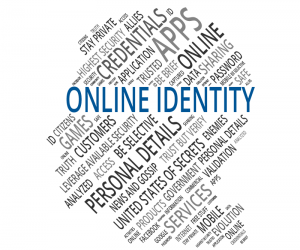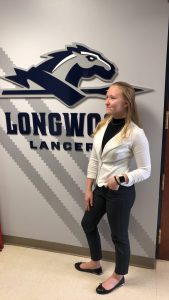
A popular discussion through professions are online social platforms and how they are a representation of oneself. As Brake put it, there are both deliberate and inadvertent self-disclosure types that share some level of information. In each case and no matter the online settings, there is little to no privacy on the Internet. On “the web” it is important to identify yourself as an individual who is both personable and professional. In order to categorize myself using these terms, I reflected on my use of social media and determined that there is more of a representation of a “real” identity than of an academic one.
Through the popular platform of Facebook, it is observed that I have more postings about herself, friends, and family. There is little to no mention of academics at Longwood University, other than having the location listed as my education. There are instances where the personal and schooling mixed, as when with friends at school, but nothing providing specifics. For example, “How can I focus on school work when there is the Olympic skating, CAPS hockey, and Jenna singing all at once?!? #USA” (Facebook) It appears that through social media, posts are about thoughts and emotions about school, sports, work, family, and friends. These are shared mostly through written messages, but sometimes through pictures as well. There is nothing negative or demeaning on her Facebook, as everything is positive and trying to be funny. Such as, “It’s only fitting to play “Highway to Hell” while stopped in 95 S traffic.” (Facebook) being a way of finding humor in an otherwise annoying situation.
Through another media platform, Instagram, is noticeably where I share pictures about my past and present, either of by myself or with others. It is here too that I mostly leaves academics out of public eye, with only a few pictures of her major’s class. For example, “Pool workouts for class is always fun.” (Instagram) Other pictures shared range from working, to friends, family, pets, and of my minor travels. The Instagram account is more secure and private than Facebook, where you must send and get accepted a friend request to view any postings.
The Twitter account is used less often than the two previously mentioned social medias. When I do ‘tweet’, it is with more honest feelings that are not shared through Facebook. Such as, “I slipped and fell in the shower this morning. Life is good.” (Twitter) This is most likely due to there being a different audience with no family members on the platform. My Twitter account is the most public out of the others, due to the same reason of having a different audience view the platform. This, in hindsight, is questioning as literally anyone can see the posts and judge based only off of what they perceive. Though being open and honest are good qualities, the account should be more private taking into consideration of the fact that any audience member can view it.
There is only one academic-based online account, which is through LinkedIn. This generalized professional platform is used the least in comparison to the other social sites and provides the minimalist amount of information about myself. It appears that this professional network is only used to view articles, news, and topics related to related to my study of interest. This is a drastic change from the other accounts, where there is enough information to find out what type of person I am. Another important difference is the bios in each account. My LinkedIn profile has the bio of “Driven student who wishes to become a certified Athletic Trainer in order to diagnose, treat, and rehabilitate injuries with patient’s while providing education on injury prevention.” (LinkedIn) While Facebook, Instagram, and Twitter have the same similar bio along the lines of “Crazy blonde who is constantly on the move. D.C sports fanatic. Swim coach. Future ATC. #LWD19 #blueblood15”. (Facebook, Instagram, Twitter) It is seen that Longwood University and my major is mentioned in each of the accounts, however there are no further details providing academic updates. This shows that I am more willing to share information about my real self, than of the educated and professional side.
In retrospect, it appears that I should equally represent the “real me” and my academic identity. What I found from pretending to be an audience member, is a sense of a lacking interest in my field and instead I am more concentrated on my personal life. A prospective employer can compare my LinkedIn account to my social medias and assume that I do not care about professionalism because I put more effort into sharing about interests on other platforms. This viewpoint will negatively affect me in the future, as my academic identity is not conveyed enough to make it known the audience. With this reflection, I learned that I should start using Facebook, Instagram, and Twitter in a more professional way in order to focus on my academic identity.
Citations
Brake, David R. Sharing Our Lives Online: Risks and Exposure in Social Media. Palgrave Macmillan, 2014.
Wangner, Samantha. “How can I focus on school work when there is…” Facebook, 13 Feb 2018, https://www.facebook.com/sprt.sam.doubleu.
Wangner, Samantha. “It’s only fitting to play…” Facebook, 24 Jun 2018, https://www.facebook.com/sprt.sam.doubleu.
W, Sam. Sprt.sam. “Pool workouts for class is always fun.” Instagram, 24 March 2018, https://www.instagram.com/p/BgU6p9tgdpCwrN69GcurkwIdRQ4Wh4URZTVUWc0/?taken-by=sprt.sam.
@Sam_DoubleU. “I slipped and fell in the shower this morning…” Twitter, 20 Jun 8:56pm, https://twitter.com/Sam_DoubleU/status/1009600904436371458.
Wangner, Samantha. “Driven student who wishes to become a certified Athletic Trainer…” LinkedIn, https://www.linkedin.com/in/samantha-wangner-4b2aa891/.
Wangner, Samantha. “Crazy blonde who is constantly on the move. D.C sports fanatic…” Facebook, https://www.facebook.com/sprt.sam.doubleu. Instagram, https://www.instagram.com/sprt.sam/. Twitter, https://twitter.com/Sam_DoubleU.
 with a major in Athletic Training. Since my athletic days and receiving various injuries, I became interested in how the human body responds and adapts to various stressors. I enjoy and am forever curious about the biomechanics and fluidity of movements before, during, and after injury. I plan on graduating in May 2018, with hopes of receiving a job with the military, collegiate, or travel team setting. I will continue education online and complete both a sports psychology and kinesiology degrees.
with a major in Athletic Training. Since my athletic days and receiving various injuries, I became interested in how the human body responds and adapts to various stressors. I enjoy and am forever curious about the biomechanics and fluidity of movements before, during, and after injury. I plan on graduating in May 2018, with hopes of receiving a job with the military, collegiate, or travel team setting. I will continue education online and complete both a sports psychology and kinesiology degrees.